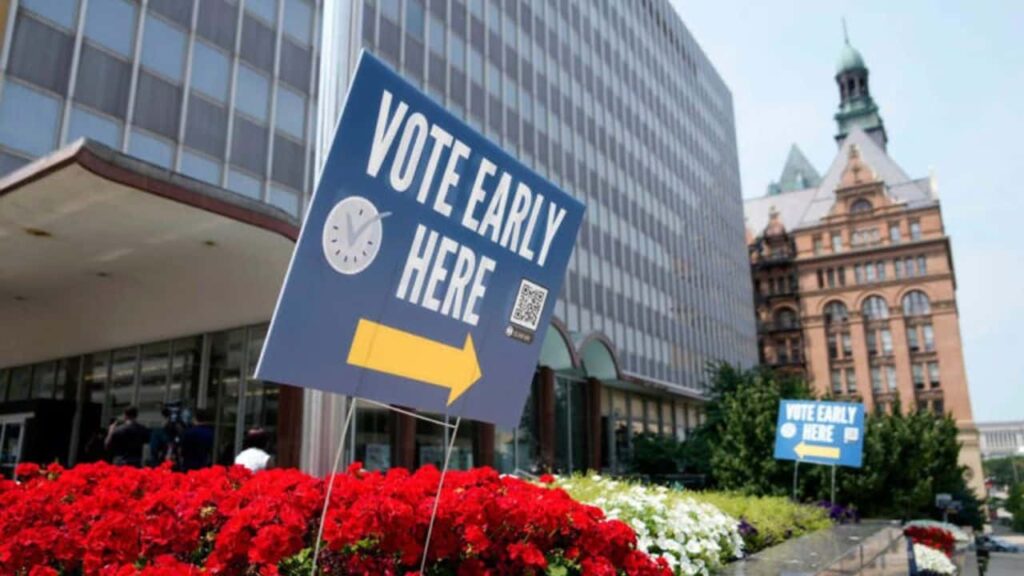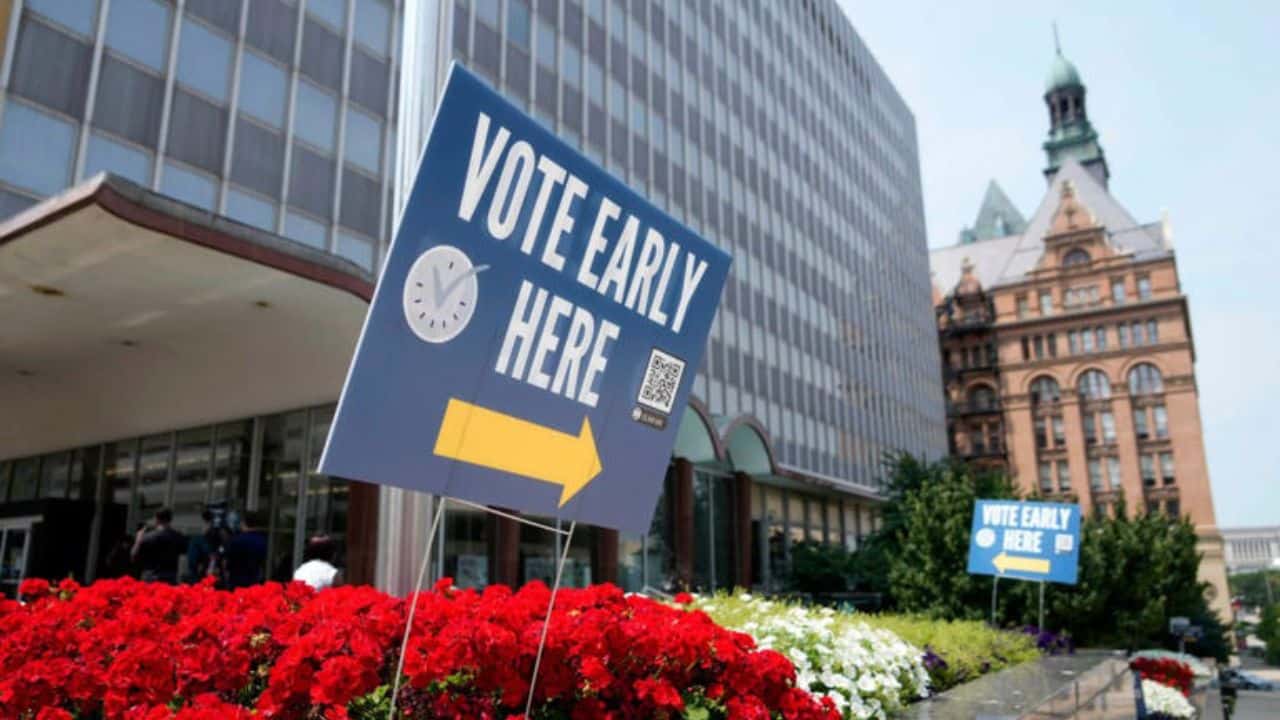Wisconsin primary turnout 2024, Wisconsin swing state election, Wisconsin Senate primary, Eric Hovde vs. Tammy Baldwin, Wisconsin constitutional amendments, Wisconsin House primaries, November election predictions
Explore how Wisconsin’s primary election turnout could provide critical insights into the state’s political direction in the 2024 November elections. This article delves into the key races, including the Senate Republican primary, House primaries, and the impact of proposed constitutional amendments on Governor Tony Evers’ authority.

Wisconsin, often seen as a microcosm of American political divisions, is once again in the spotlight as its primary election turnout is set to be a key indicator of the state’s potential swing in the upcoming November elections. The state has long been a battleground, with razor-thin margins deciding many recent elections. This year’s primary is particularly critical as it not only sets the stage for the general election but also serves as a barometer for voter enthusiasm and party mobilization.
The Stakes in Wisconsin
Wisconsin’s political landscape is characterized by its deep divisions, with rural areas leaning heavily Republican and urban centers typically voting Democrat. The state has swung between both parties in recent presidential elections, making it a focal point for both Republicans and Democrats in 2024. The primary turnout, therefore, is more than just a preliminary event; it is a potential preview of what might unfold in November.
Republican state lawmakers are aiming to galvanize their base by placing a pair of constitutional amendments on the ballot. These amendments are designed to limit the powers of Democratic Governor Tony Evers, particularly his authority to allocate federal funds. This move has sparked significant debate, with proponents arguing for greater legislative oversight, while opponents see it as an attempt to undermine the governor’s power.
The amendments highlight the ongoing tension between the Republican-controlled legislature and the Democratic governor, a dynamic that has defined much of Evers’ tenure. The outcome of this vote could signal the strength of Republican efforts to reshape state governance ahead of the general election.
The Senate Republican Primary
The Senate Republican primary has also garnered significant attention, with Eric Hovde, a business developer, expected to win easily. Hovde’s victory would set up a high-stakes battle against incumbent Democratic Senator Tammy Baldwin in November. Baldwin, who has held the seat since 2013, is a key figure for Democrats, and her race is seen as crucial for maintaining control of the Senate.
Hovde’s primary win would not only reflect the strength of his campaign but also the broader sentiment within the Republican electorate. A strong turnout in support of Hovde could indicate a motivated Republican base, eager to flip the Senate seat and bolster their influence in Washington.
House Primaries: A Test of Party Strength
In addition to the Senate race, there are two major House primaries that could provide insight into the state’s political direction. The Third Congressional District features a fiercely contested Democratic primary, with three candidates vying for the chance to challenge Trump-endorsed Republican Rep. Derrick Van Orden in November. Van Orden’s seat is considered one of the most vulnerable Republican-held districts, making this race a priority for Democrats.
Rebecca Cooke, a former political fundraiser and strategist, has emerged as the frontrunner in terms of fundraising and campaign momentum. However, she faces stiff competition from state Rep. Katrina Shankland, who has garnered significant support from state Democratic leaders. The outcome of this primary will be a critical indicator of the Democratic Party’s strength and unity heading into the general election.
Similarly, in the Eighth Congressional District, the Republican primary features a clash between Trump-endorsed Tony Wied and state Sen. Andrew Jacque, an anti-abortion rights advocate. Former state Sen. Roger Roth, who identifies as a “Trump Conservative,” is also in the race, though he has been disavowed by Trump. This primary is not just about filling a vacant seat; it’s a test of Trump’s enduring influence within the party, particularly in northern Wisconsin.
Voter Turnout: A Predictive Measure
One of the most telling aspects of Tuesday’s primary will be voter turnout. Wisconsin has a history of close elections, with four of the last six presidential elections decided by a margin of just 20,000 votes. Given this, the turnout in the primary could offer a glimpse into which party has successfully energized its base ahead of November.
Turnout in Wisconsin’s April presidential primary was moderate, and with no presidential candidates on the ballot this time, only the most engaged voters are expected to participate. This means that the turnout on Tuesday could be a more accurate reflection of each party’s organizational strength and voter enthusiasm. A strong turnout from either side would be a positive sign for that party’s prospects in the fall.
Polls Reflect a Tight Race
Recent polling by Marquette Law School underscores the competitive nature of the upcoming general election. The poll showed former President Donald Trump and Vice President Kamala Harris in a virtual tie among registered voters in Wisconsin, with Trump holding a narrow 1% lead. This razor-thin margin highlights the importance of every vote and every district, making the primary turnout even more significant.
The Constitutional Amendments: A Flashpoint
The most consequential items on the primary ballot are undoubtedly the constitutional amendments aimed at curbing Governor Evers’ spending authority. These amendments would require legislative approval for the allocation of federal funds, such as the COVID-19 relief money that has been at the center of controversy in the state.
Supporters of the amendments argue that they are necessary to ensure transparency and accountability in government spending. They contend that Governor Evers has overstepped his bounds, using federal funds for projects like a soccer stadium in Milwaukee without adequate oversight. The Wisconsin Institute for Law and Liberty (WILL), a conservative group backing the amendments, has launched a six-figure campaign to rally support.
Opponents, however, see the amendments as an undemocratic power grab, designed to strip the governor of his ability to act independently in times of crisis. They argue that the amendments would lead to gridlock and delay in critical situations where swift action is needed. The debate over these amendments has attracted significant outside spending, with the “Vote No” campaign receiving substantial financial backing.
The Broader Implications
The outcome of Tuesday’s primary will have far-reaching implications, not just for Wisconsin but for the national political landscape. As a swing state with a history of close elections, Wisconsin’s primary turnout and the results of key races will be closely watched by both parties. A strong showing by Republicans could signal a red wave in November, while robust Democratic turnout could indicate that the party’s base is energized and ready to defend its turf.
Moreover, the primary will offer insights into the effectiveness of both parties’ campaign strategies. For Republicans, the focus has been on leveraging cultural and economic issues to rally their base, while Democrats have emphasized protecting voting rights and maintaining social safety nets. The success of these strategies will be evident in the turnout and the margins of victory in the contested races.
Conclusion: A Precursor to November
Wisconsin’s primary election is more than just a prelude to November; it is a critical moment that could set the tone for the entire general election. With high-stakes races, constitutional amendments, and a deeply divided electorate, the turnout and results of this primary will provide valuable clues about which way the state — and possibly the nation — is likely to swing.
As the nation watches Wisconsin, the importance of voter engagement, party unity, and strategic campaigning will be on full display. The lessons learned from Tuesday’s primary will shape the final stretch of the 2024 election cycle, making it a pivotal event in the battle for control of Wisconsin and, by extension, the country.
Read More
- Texas AG Ken Paxton Challenges State Fairs Concealed Carry Ban Legal Battle Over Gun Rights
- Skai Jackson Arrested for Domestic Battery The Shocking Details and Whats Next
- Why Joel Embiid Chose to Play for Team USA in the 2024 Paris Olympics
- SpaceX and Northrop Grumman Successfully Launch Resupply Mission to ISS
